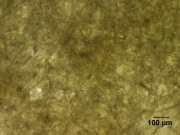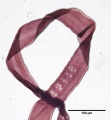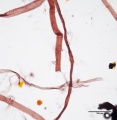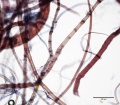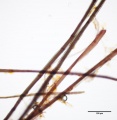Difference between revisions of "Alpha cellulose"
JMcGlinchey (talk | contribs) |
|||
| (3 intermediate revisions by 2 users not shown) | |||
| Line 4: | Line 4: | ||
One of three classes of [[cellulose|cellulose]], alpha cellulose has the highest degree of polymerization and is the most stable. The other two classes, known as [[hemicellulose|hemicelluloses]], are [[beta%20cellulose|beta cellulose]] and [[gamma%20cellulose|gamma cellulose]]. Alpha cellulose is the major component of wood and paper pulp. It may be separated from the other components by soaking the pulp in a 17.5% solution of [[sodium%20hydroxide|sodium hydroxide]]. The pure white, alpha cellulose is insoluble and can be filtered from the solution and washed prior to use in the production of paper or cellulosic polymers. A high percent of alpha cellulose in paper will provides a stable, permanent material. [[Linen|Linen]] and [[cotton|cotton]] contain high proportions of alpha cellulose. | One of three classes of [[cellulose|cellulose]], alpha cellulose has the highest degree of polymerization and is the most stable. The other two classes, known as [[hemicellulose|hemicelluloses]], are [[beta%20cellulose|beta cellulose]] and [[gamma%20cellulose|gamma cellulose]]. Alpha cellulose is the major component of wood and paper pulp. It may be separated from the other components by soaking the pulp in a 17.5% solution of [[sodium%20hydroxide|sodium hydroxide]]. The pure white, alpha cellulose is insoluble and can be filtered from the solution and washed prior to use in the production of paper or cellulosic polymers. A high percent of alpha cellulose in paper will provides a stable, permanent material. [[Linen|Linen]] and [[cotton|cotton]] contain high proportions of alpha cellulose. | ||
| − | == | + | == Physical and Chemical Properties == |
Paper pulp that is high in alpha cellulose can be identified using [[Graff "C" stain]], which will stain pinkish red. Examples of common paper fibers that are high in alpha cellulose include [[cotton]], [[flax]], [[ramie]], and [[kozo]]. Alpha cellulose pulps can be created from wood pulps using extended [[sulfite process|sulfite]], or mercerized [[kraft process|kraft]] pulping methods. | Paper pulp that is high in alpha cellulose can be identified using [[Graff "C" stain]], which will stain pinkish red. Examples of common paper fibers that are high in alpha cellulose include [[cotton]], [[flax]], [[ramie]], and [[kozo]]. Alpha cellulose pulps can be created from wood pulps using extended [[sulfite process|sulfite]], or mercerized [[kraft process|kraft]] pulping methods. | ||
| Line 11: | Line 11: | ||
<gallery> | <gallery> | ||
| − | File:SBA 40x pinoidpitslabel.jpg|Softwood Bleached Alpha Fiber stained with Graff "C" | + | File:SBA 40x pinoidpitslabel.jpg|Softwood Bleached Alpha Fiber stained with Graff "C" stain |
Cotton rag 40x endslabel.jpg|Cotton rag fibers stained with Graff "C" stain | Cotton rag 40x endslabel.jpg|Cotton rag fibers stained with Graff "C" stain | ||
| − | File:Flax 40x nodes bastshive.jpg|Flax pulp stained with Graff "C" | + | File:Flax 40x nodes bastshive.jpg|Flax pulp stained with Graff "C" stain |
| − | File:Kozo 40x.jpg|Kozo fibers stained with Graff "C" | + | File:Kozo 40x.jpg|Kozo fibers stained with Graff "C" stain |
| + | File:Ramie 10x.jpg|Ramie fibers stained with Graff "C" stain | ||
</gallery> | </gallery> | ||
| − | == | + | ==Resources and Citations== |
* G.S.Brady, ''Materials Handbook'', McGraw-Hill Book Co., New York, 1971 Comment: p. 169 | * G.S.Brady, ''Materials Handbook'', McGraw-Hill Book Co., New York, 1971 Comment: p. 169 | ||
| Line 37: | Line 38: | ||
* Theodore J. Reinhart, 'Glossary of Terms', ''Engineered Plastics'', ASM International, 1988 | * Theodore J. Reinhart, 'Glossary of Terms', ''Engineered Plastics'', ASM International, 1988 | ||
| − | * Website | + | * Website: http://www.archivalsuppliers.com/glossary.html |
[[Category:Materials database]] | [[Category:Materials database]] | ||
Latest revision as of 10:18, 26 April 2022
Description
One of three classes of Cellulose, alpha cellulose has the highest degree of polymerization and is the most stable. The other two classes, known as hemicelluloses, are Beta cellulose and Gamma cellulose. Alpha cellulose is the major component of wood and paper pulp. It may be separated from the other components by soaking the pulp in a 17.5% solution of Sodium hydroxide. The pure white, alpha cellulose is insoluble and can be filtered from the solution and washed prior to use in the production of paper or cellulosic polymers. A high percent of alpha cellulose in paper will provides a stable, permanent material. Linen and Cotton contain high proportions of alpha cellulose.
Physical and Chemical Properties
Paper pulp that is high in alpha cellulose can be identified using Graff "C" stain, which will stain pinkish red. Examples of common paper fibers that are high in alpha cellulose include Cotton, Flax, Ramie, and Kozo. Alpha cellulose pulps can be created from wood pulps using extended sulfite, or mercerized kraft pulping methods.
Additional Images
Resources and Citations
- G.S.Brady, Materials Handbook, McGraw-Hill Book Co., New York, 1971 Comment: p. 169
- Matt Roberts, Don Etherington, Bookbinding and the Conservation of Books: a Dictionary of Descriptive Terminology, U.S. Government Printing Office, Washington DC, 1982
- The Dictionary of Paper, American Paper Institute, New York, Fourth Edition, 1980
- E.J.LaBarre, Dictionary and Encyclopedia of Paper and Paper-making, Swets & Zeitlinger, Amsterdam, 1969
- A Glossary of Paper Conservation Terms, Margaret Ellis (ed.), Conservation Center of the Institute of Fine Arts, New York City, 1998
- J. H. Graff "Color Atlas for Fiber Identification" The Institute of Paper Chemistry, Appleton, WI, 1940.
- Roy Perkinson, contributed information, 1998
- Walter Rantanen. "Fiber ID Course." Integrated Paper Services. June 2013. Lecture.
- Theodore J. Reinhart, 'Glossary of Terms', Engineered Plastics, ASM International, 1988
